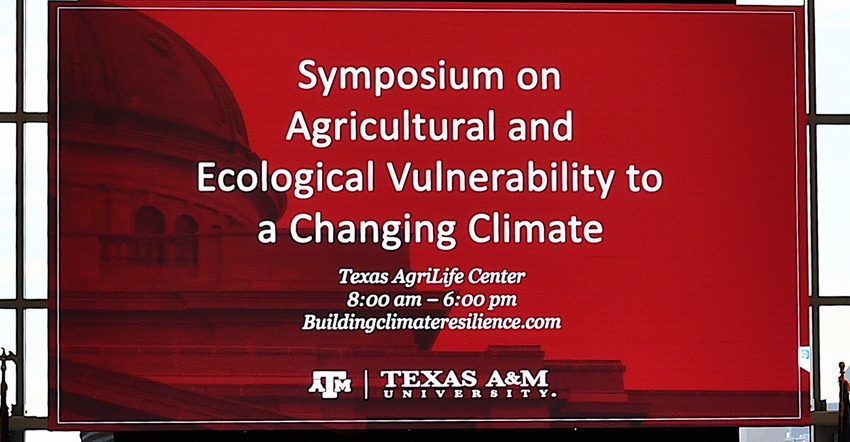November 5, 2018

Climate and its impacts on agricultural and ecological systems highlighted a recent symposium held at the Texas A&M AgriLife Center on the Texas A&M University campus in College Station.
The conference was part of the Texas A&M University Grand Challenge initiative funded by the College of Agriculture and Life Sciences. A variety of scholars from around the world presented research on the evolving climate and associated issues affecting both agriculture and ecological systems.
The symposium was organized and planned by Texas A&M professors Drs. David Briske, ecosystems and science management; Thomas Lacher Jr., wildlife and fisheries science; Bruce McCarl, agricultural economics; and Ramalingam Saravanan, atmospheric sciences.
“The climate is evolving across arid areas like Texas with hotter temperatures and more extreme events like floods and droughts,” Saravanan said.
Lacher added, “The evolving climate has major effects on integrated landscapes affecting plant growth, agricultural productivity, water demands and wildlife populations.”
McCarl said climate projections are that warming and drying will continue.
“This will adversely impact agricultural productivity and natural ecosystems along with the state’s rural economy,” he said.
Lacher said the symposium will help bring together researchers from a variety of disciplines to better develop collaboration.
“At the end of the day, we want to enhance the institutional collaboration to address economic, social and ecological challenges to develop adaptation strategies to minimize adverse climate impacts,” he said.
Discussions initially focused on what has happened in terms of past climate trends and future prospects. They then turned to the vulnerability of ecological systems and agriculture in Texas as well as other semi-arid regions. Participants focused on the capacity to foresee future vulnerability and how to limit disruptive climate impacts through land and wildlife management.
“We don’t know what this will morph into, but we do know that the College of Agriculture and Life Sciences at Texas A&M and Vice Chancellor Dr. Patrick Stover are committed to all of the activities behind these research efforts,” said Dr. David Reed, horticulture professor and associate dean for graduate programs and faculty development.
“There are relationships between food and nutrition, and the issues we are addressing today regarding climate change have broad-reaching implications to everyone throughout Texas and the nation,” Reed said.
Speakers shared various perspectives on climate change, ecological and agricultural research findings and U.S. Department of Agriculture international agency programs to address the challenge.
Symposium organizers say the event will serve as a starting point to promote future collaboration among academic disciplines to develop research programs that will enable Texas to effectively cope with future climate conditions.
“We have some of the best researchers in the world working on various aspects of climate, agricultural and ecological systems, and it is critical that this expertise be integrated to effectively address the complexity of this climate challenge,” Briske said.
“The best way to address these future challenges is through collaboration, and this conference is a step forward by bringing this diverse set of experts together,” he said.
Post-graduate students from agricultural economics, wildlife and fisheries, ecosystems science and management, and atmospheric sciences echoed these thoughts, indicating such work is both an important component of their current education and a topic they believe will continue to demand attention in the future.
Organizers say they will gather input from the participating researchers and seek potential funding to promote further collaborations across the university system with potential partners throughout the world.
These insights will also be incorporated into the classroom and graduate research programs to develop the next generation of researchers to address this critical challenge, they said.
For more information, visit https://buildingclimateresilience.com/ .
About the Author(s)
You May Also Like




